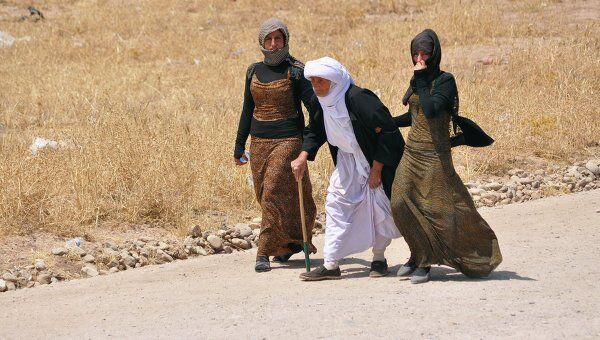UNITED NATIONS, October 30 (RIA Novosti) — More than four million people in Syria will receive fewer food assistance and one million will not get warm clothes and blankets due to lack of funding, the UN aid official said on Thursday.
“At this point last year, the $1.4 billion appeal for activities inside Syria was 57 percent funded. Today we have received only 39 percent of the required $2.3 billion. The consequences are stark. Food assistance will be reduced for over four millions Syrians. One million will not receive blankets, warm clothes and fuel ahead of the winter,” the UN's Assistant Secretary-General for Humanitarian Affairs Kyung-wha Kang told the UN Security Council.
Funds were sought at an international conference, held in Berlin on October 28 for Syrians, who have fled into neighboring countries.
Kyung-wha Kang reminded the Security Council that in September some 200,000 people fled the Islamic State's advance seeking refuge in Turkey. "Nearly 14,000 of whom have subsequently sought refuge in Iraq, adding to the numbers of refugees and internally displaced persons already seeking refuge there," Kang said.
Kang said that the IS militants, as well as the other parties of the conflict, are "killing and injuring people and destroying villages, towns and cities with impunity."
The humanitarian infrastructure is also being impacted, Kang said, noting that "medical facilities and personnel also continue to be attacked and are otherwise impacted by the conflict." According to Kang, nine medical staff were killed in September and seven health care facilities were hit. "Twenty-four percent of hospitals are reported as not functioning," Kang added.
"We are still unable to deliver sufficient quantities of aid to people in the hardest to reach areas. Fighting and insecurity continue to hamper our ability to respond. WFP [World Food Program] was once again unable to reach the nearly 600,000 people targeted in ISIL-controlled Deir ez-Zorand Raqqa governorates, which were last reached in May and July, respectively. Violence and insecurity in the north has also cut in half WFP's cross line deliveries in Aleppo and Idlib," Kang said.
Anti-government protests broke out in Syria in March 2011, leading to a civil war, which has been going on in the country for three years.
The IS, also known as the Islamic State of Iraq and Greater Syria (ISIS) or the Islamic State of Iraq and the Levant (ISIL), has been fighting the Syrian government since 2012. In June 2014, the group extended its attacks to northern and western Iraq and declared an Islamic caliphate on the territories under its control.


